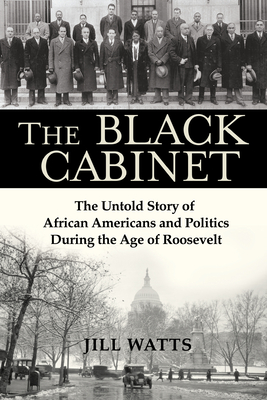The Black Cabinet: The Untold Story of African Americans and Politics During the Age of Roosevelt

The Black Cabinet: The Untold Story of African Americans and Politics During the Age of Roosevelt
A magnificently researched, dramatically told work of narrative nonfiction about the history, evolution, impact, and ultimate demise of what was known in the 1930s and 1940s as President Franklin Delano Roosevelt's Black Cabinet.
In 1932 in the midst of the Great Depression, Franklin Delano Roosevelt won the presidency with the help of key African American defectors from the Republican Party. At the time, most African Americans lived in poverty, denied citizenship rights and terrorized by white violence. As the New Deal began, a "black Brain Trust" joined the administration and began documenting and addressing the economic hardship and systemic inequalities African Americans faced. They became known as the Black Cabinet, but the environment they faced was reluctant, often hostile, to change.
"Will the New Deal be a square deal for the Negro?" The black press wondered. The Black Cabinet set out to devise solutions to the widespread exclusion of black people from its programs, whether by inventing tools to measure discrimination or by calling attention to the administration's failures. Led by Mary McLeod Bethune, an educator and friend of Eleanor Roosevelt, they were instrumental to Roosevelt's continued success with black voters. Operating mostly behind the scenes, they helped push Roosevelt to sign an executive order that outlawed discrimination in the defense industry. They saw victories--jobs and collective agriculture programs that lifted many from poverty--and defeats--the bulldozing of black neighborhoods to build public housing reserved only for whites; Roosevelt's refusal to get behind federal anti-lynching legislation. The Black Cabinet never won official recognition from the president, and with his death, it disappeared from view. But it had changed history. Eventually, one of its members would go on to be the first African American Cabinet secretary; another, the first African American federal judge and mentor to Thurgood Marshall.
Masterfully researched and dramatically told, The Black Cabinet brings to life a forgotten generation of leaders who fought post-Reconstruction racial apartheid and whose work served as a bridge that Civil Rights activists traveled to achieve the victories of the 1950s and '60s.
PRP: 186.00 Lei
Acesta este Prețul Recomandat de Producător. Prețul de vânzare al produsului este afișat mai jos.
167.40Lei
167.40Lei
186.00 LeiLivrare in 2-4 saptamani
Descrierea produsului
A magnificently researched, dramatically told work of narrative nonfiction about the history, evolution, impact, and ultimate demise of what was known in the 1930s and 1940s as President Franklin Delano Roosevelt's Black Cabinet.
In 1932 in the midst of the Great Depression, Franklin Delano Roosevelt won the presidency with the help of key African American defectors from the Republican Party. At the time, most African Americans lived in poverty, denied citizenship rights and terrorized by white violence. As the New Deal began, a "black Brain Trust" joined the administration and began documenting and addressing the economic hardship and systemic inequalities African Americans faced. They became known as the Black Cabinet, but the environment they faced was reluctant, often hostile, to change.
"Will the New Deal be a square deal for the Negro?" The black press wondered. The Black Cabinet set out to devise solutions to the widespread exclusion of black people from its programs, whether by inventing tools to measure discrimination or by calling attention to the administration's failures. Led by Mary McLeod Bethune, an educator and friend of Eleanor Roosevelt, they were instrumental to Roosevelt's continued success with black voters. Operating mostly behind the scenes, they helped push Roosevelt to sign an executive order that outlawed discrimination in the defense industry. They saw victories--jobs and collective agriculture programs that lifted many from poverty--and defeats--the bulldozing of black neighborhoods to build public housing reserved only for whites; Roosevelt's refusal to get behind federal anti-lynching legislation. The Black Cabinet never won official recognition from the president, and with his death, it disappeared from view. But it had changed history. Eventually, one of its members would go on to be the first African American Cabinet secretary; another, the first African American federal judge and mentor to Thurgood Marshall.
Masterfully researched and dramatically told, The Black Cabinet brings to life a forgotten generation of leaders who fought post-Reconstruction racial apartheid and whose work served as a bridge that Civil Rights activists traveled to achieve the victories of the 1950s and '60s.
Detaliile produsului










